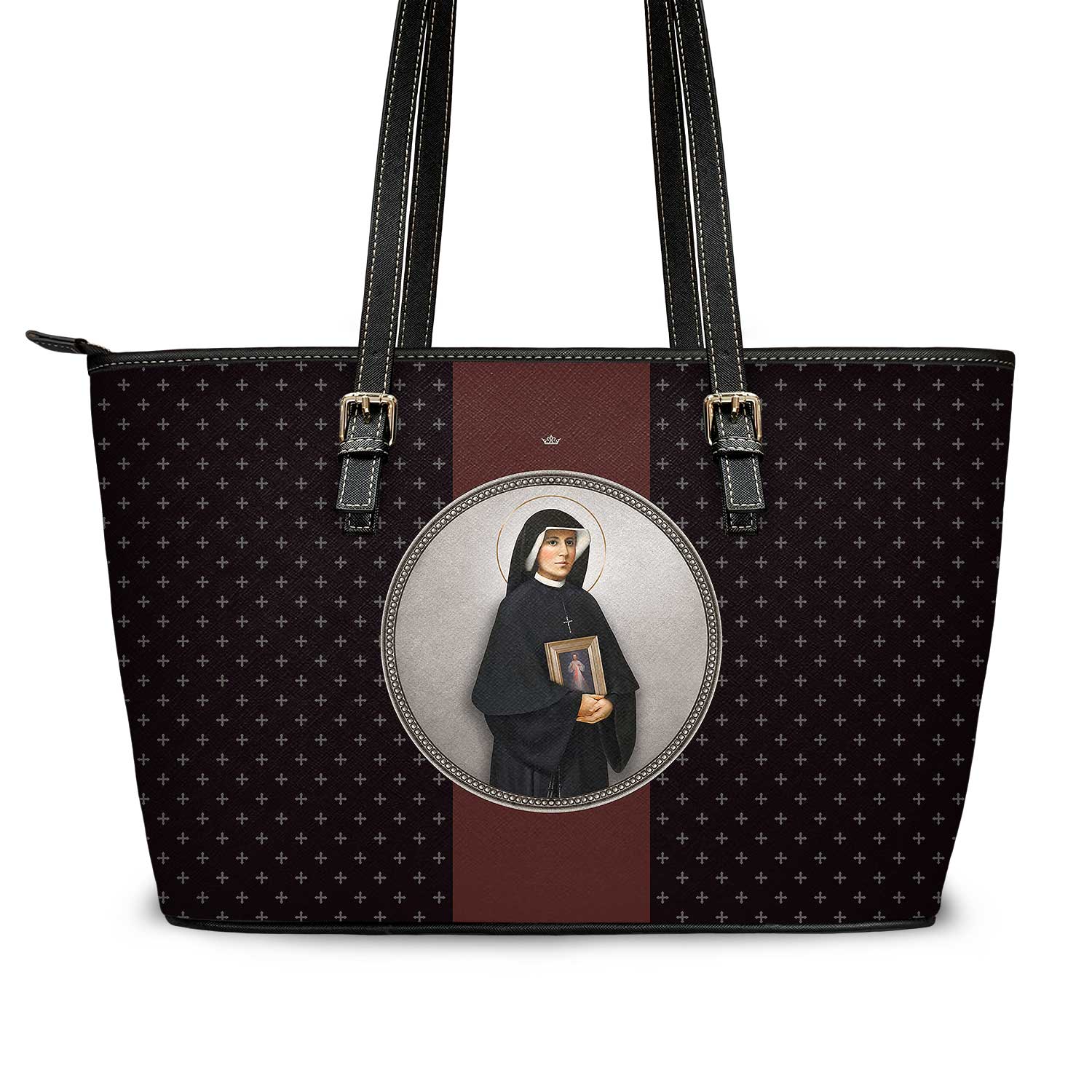
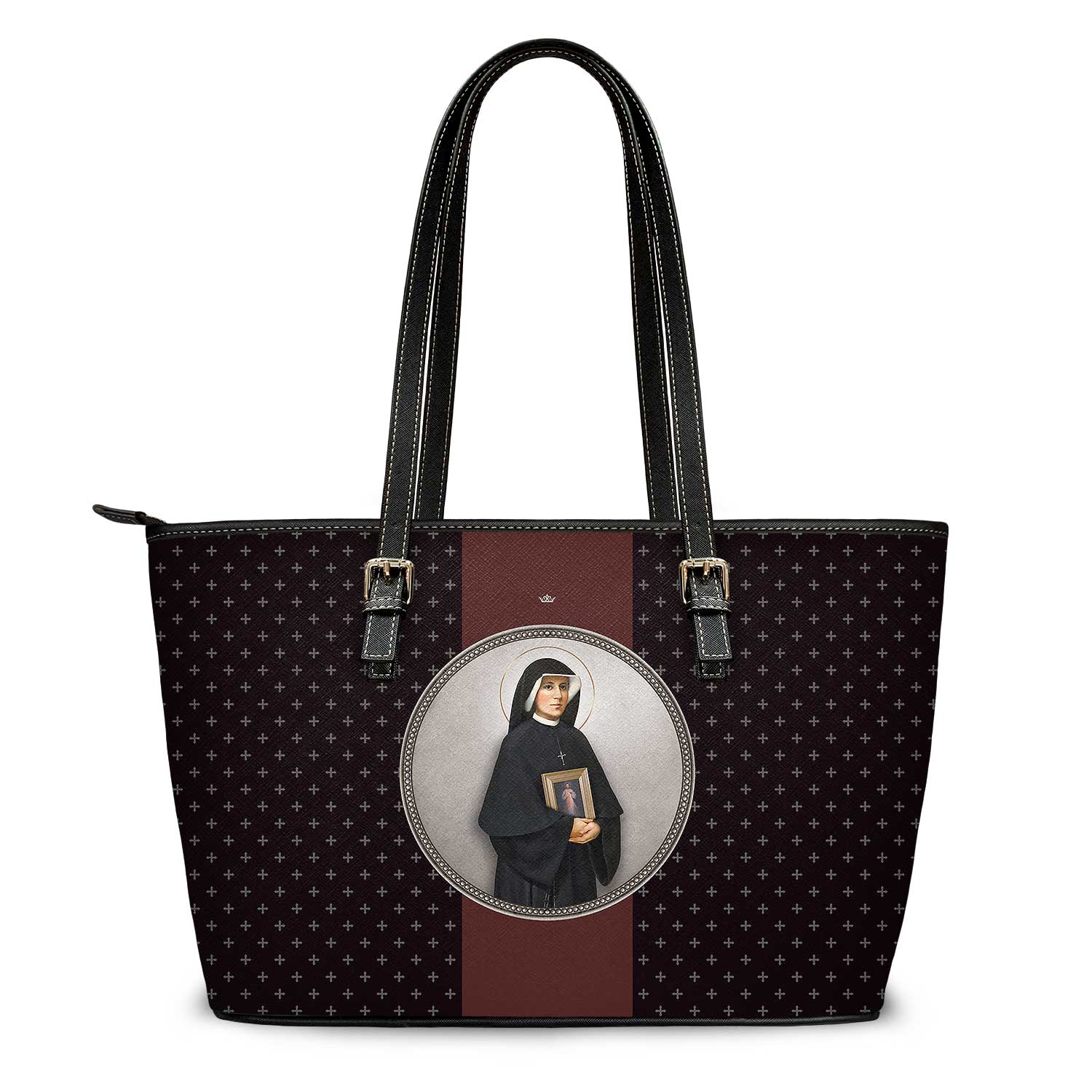
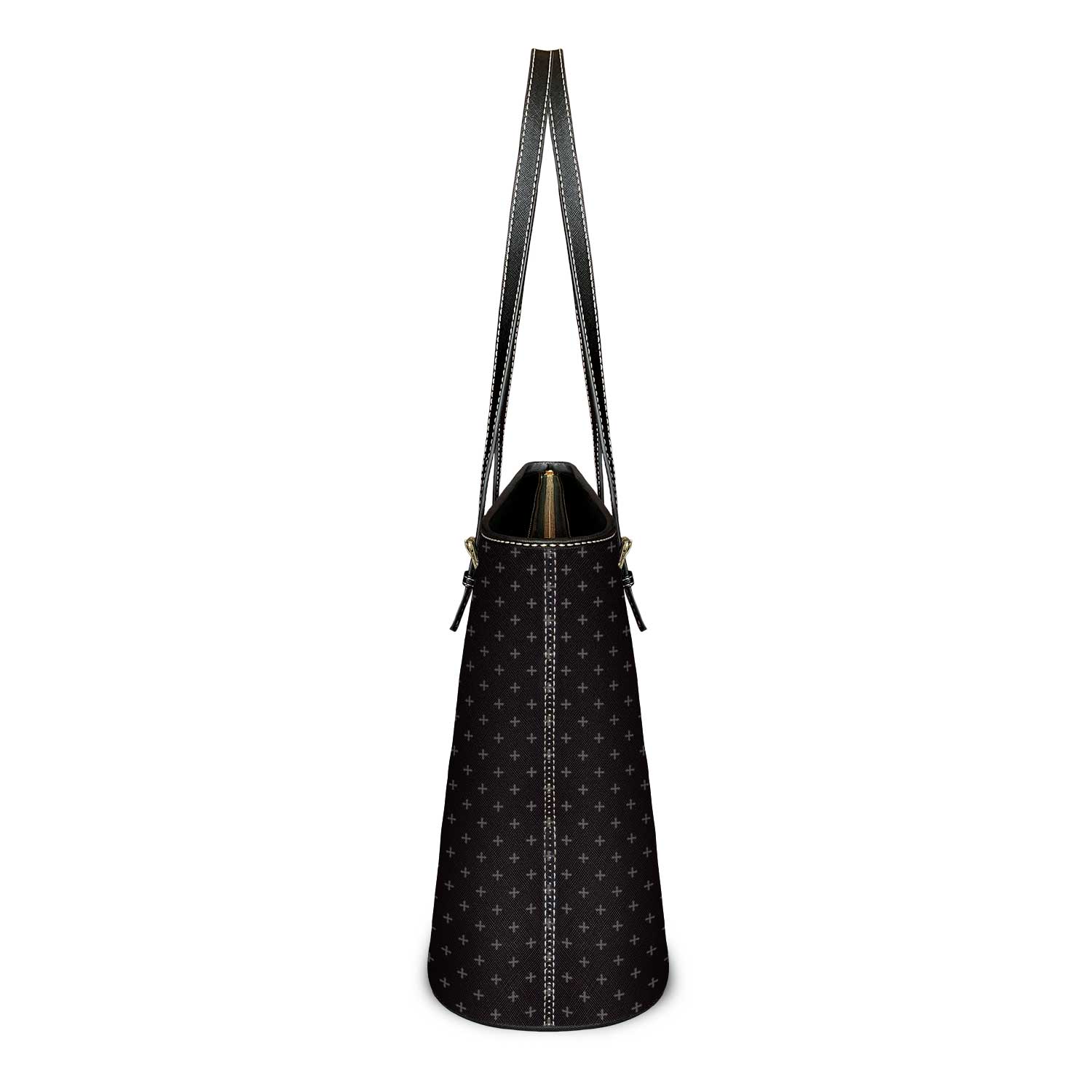
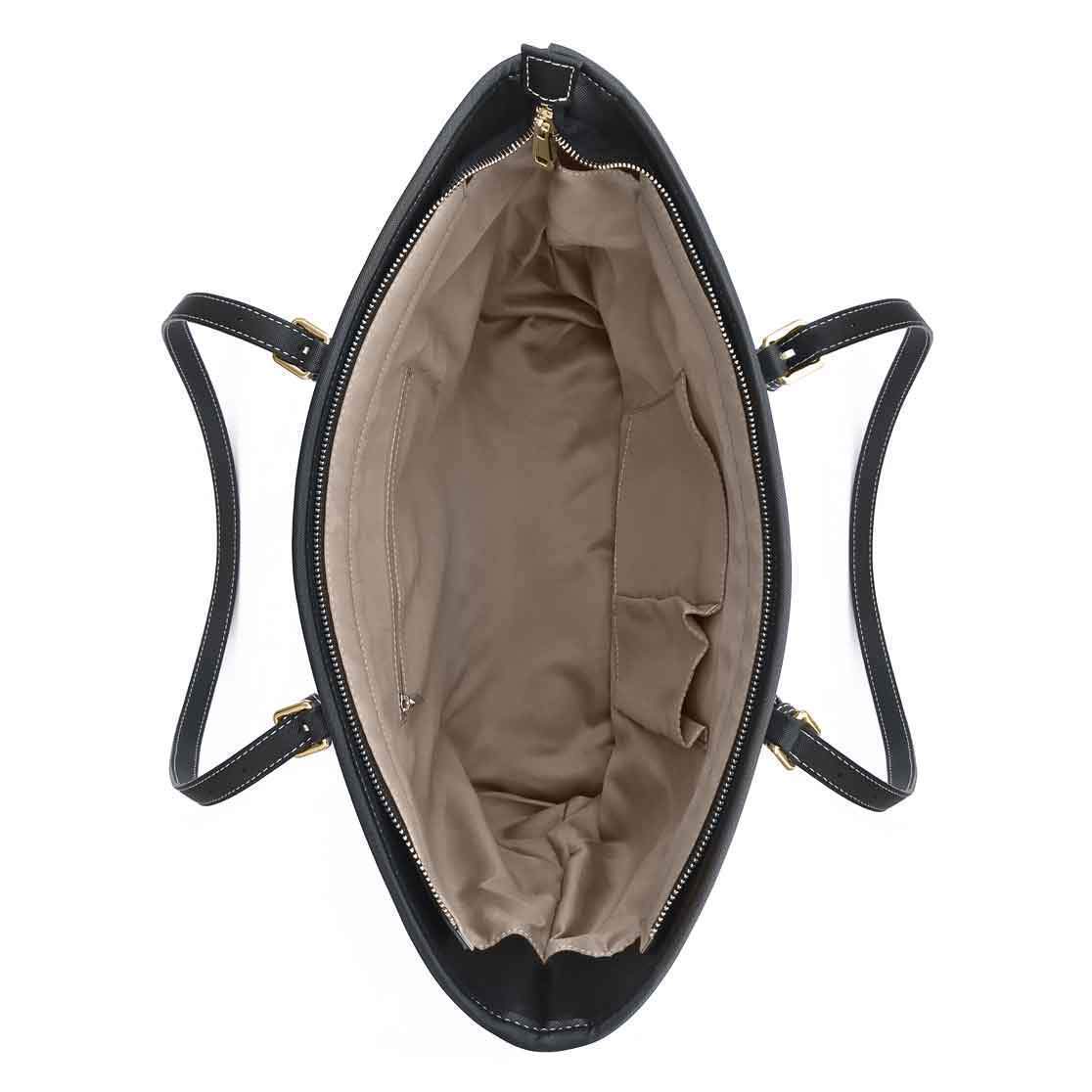

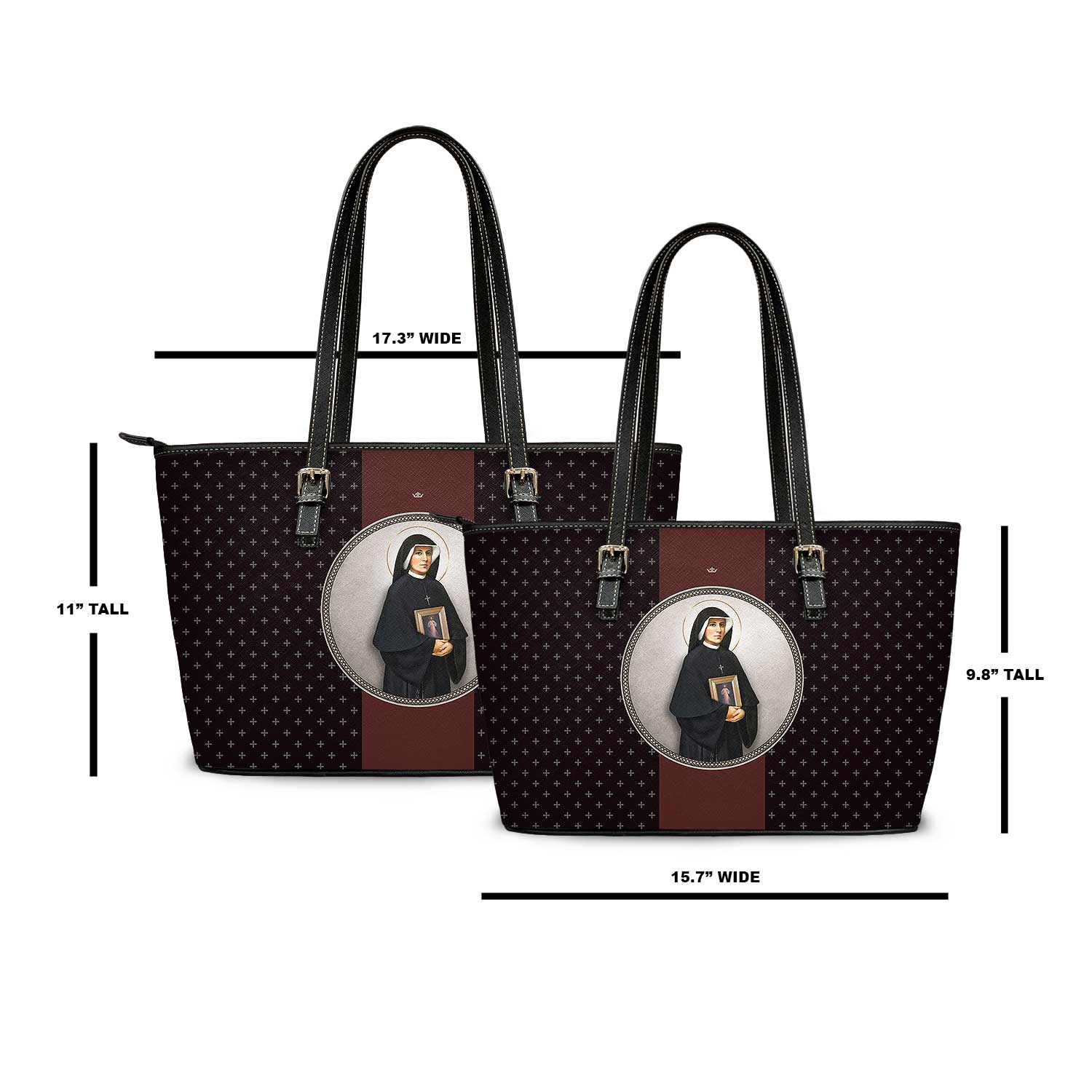
St. Faustina Medallion Crosses Tote Bag (Black)
The St. Faustina Medallion Crosses Tote Bag features a beautiful double-sided custom print on a premium quality imitation leather tote bag. Comfortable and sturdy adjustable carrying straps with high-quality stitching for long-lasting durability. Soft, brushed polyester lining is finished with three interior side pockets to keep your items organized. A truly unique way to share your faith or a special holiday, birthday or confirmation gift.
■ Medium: 9.8"T x 15.7”W x 5"D
■ Large: 11"T x 17.3"W x 6"D
■ Adjustable 11" Straps
■ Zippered Top Closure

This is a couture item which is custom made-on-demand. Our couture collections feature exclusive, custom designs with our signature crown somewhere within the design. Not sold in stores and you won’t find this anywhere else. EXCLUSIVELY AT VENXARA.
Shipping + Delivery
These custom made-on-demand Tote Bags ship world-wide directly from our exceptional craftsmen in China. When placing your order, please use a physical street address for DHL Express delivery. DHL Express can not deliver to a PO Box. Destination tracking is available for most countries. A tracking number will be emailed to you once your order has shipped.
Production Time: 5-7 working days
DHL Express Ship Time: 3-6 days
Please Note: During peak shopping seasons, production and ship time may take a little longer than normal. If you are buying this item as a gift, please order as early as possible. We don't want to disappoint you or the gift recipient with a potentially delayed order.
For countries where tracking numbers are not available, this item should arrive by regular post within 2-4 weeks. Orders that have not arrived within 45 days of order processing are eligible for a free reshipment or a refund.
Materials + Care
MATERIALS
These Tote Bags are made with a high quality, textured imitation leather with a Safiano Finish created by the luxury designer brand Prada. This material is made with split leather (that’s the fibrous part of the hide left over from making genuine leather) which has been bonded with polyurethane. This material is extremely durable and the image will not fade, peel or flake. The interior lining is a soft, brushed polyester. These Tote Bags are vegan and eco friendly.
CARE
Your freshly made bag might arrive with a "new bag smell" (similar to a new car smell) that some people love and others do not. When you receive your bag, please unwrap it and allow the bag breathe for 24-48 hours to absorb the natural scents of its surroundings. To clean your tote bag, use a soft, damp towel to wipe away any dust or dirt. You can use a mild soap or gentle cleaning spray if needed. Please do not put this tote bag in the washing machine.
About St. Faustina

ST. FAUSTINA KOWALSKA
1905 — 1938
Feast Day October 5
Patron Saint of mercy.
Maria Faustina Kowalska (born Helena Kowalska) was a Polish Roman Catholic nun and mystic. She was the third of ten children born to a poor but devout Catholic family. Helena had very little education and was rejected from several convents because of her poverty and lack of education. At the age of 20, Helena was finally accepted and entered the Congregation of the Sisters of Our Lady of Mercy in Warsaw, Poland. There, she took the name Sr. Faustina and spent time in convents in both Poland and Lithuania.
Throughout her life, Sr. Faustina reported having visions of Jesus and conversations with him, of which she wrote in her diary, later published as The Diary of Saint Maria Faustina Kowalska: Divine Mercy in My Soul. Her biography, submitted to the Congregation for the Causes of Saints, quoted some of these conversations with Jesus regarding the Divine Mercy devotion. Her apparitions of Jesus inspired the Roman Catholic devotion to the Divine Mercy and earned her the title of “Secretary of Divine Mercy.”
Sr. Faustina was moved to Vilnius where she met her confessor Father Michał Sopocko, who supported her devotion to the Divine Mercy. Faustina and Sopocko directed an artist to paint the first Divine Mercy image, based on Faustina’s vision of Jesus. Sopocko used the image in celebrating the first Mass on the first Sunday after Easter. Subsequently, Pope John Paul II established the Feast of Divine Mercy on that Sunday of each liturgical year.
In her diary, Faustina wrote: In the evening, when I was in my cell, I became aware of the Lord Jesus clothed in a white garment. One hand was raised in blessing, the other was touching the garment at the breast. From the opening of the garment at the breast there came forth two large rays, one red and the other pale. In silence I gazed intently at the Lord; my soul was overwhelmed with fear, but also with great joy. After a while Jesus said to me, Paint an image according to the pattern you see, with the inscription: Jesus, I trust in You. I promise that the soul that will venerate this image will not perish. I also promise victory over its enemies already here on earth, especially at the hour of death. I myself will defend it as My own glory.
In 1936, Faustina became ill, since speculated to be tuberculosis. As her health deteriorated, Faustina’s visions intensified, and she was said to be looking forward to the end to her life. She died on October 5, 1938 at the age of 33 and was buried in a tomb in Krakow’s Basilica of Divine Mercy. The Roman Catholic Church canonized Sr. Faustina as a saint in 2000. The mystic is classified in the liturgy as a virgin and is venerated within the church as the “Apostle of Divine Mercy.”
Choose options






